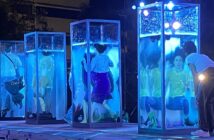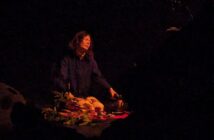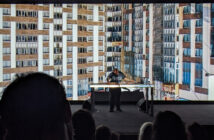If Wednesday’ opening line-up had a theme, it was evisceration. Most of the featured artists chose to bypass the tonal capabilities of their instruments, and played instead as if they were pulling out sinew and bone.
Manon Liu-Winter concentrated on plucking and scraping the strings of a grand piano; when she did use the keyboard, it was with percussive attack. Her lengthy second piece harnessed digital manipulation in order to (re)create the sounds of a railway line. There was much shunting and echoing, and the evocation of steel on steel.
Amanda Stewart works with her voice at the very limits of language. Using two microphones, she crafts glistening strands of intense yet highly controlled sound. It’s all centred in the mouth, full of bubbles and pops and clicks. Vocal tone almost never enters into proceedings, so when it does – as with a reference to Wittgenstein that’s left hanging, mid-sentence – it’s all the more noticeable. Peter Farrar removes the mouthpiece from his saxophone and concentrates on expelling air, free of notes, while Dale Gorfinkel adds subtle squeaks and rumbles on prepared vibraphone.
Robin Fox and Anthony Pateras sit down side by side with their laptops, although Pateras doesn’ stay in his seat for long. The two of them sculpt passages of harsh digital interference in short, sharp bursts. I can’ shake the idea that they’re actually playing a first-person shooter game, and what we’re hearing is the soundtrack, many times amplified. They’re like a Nintendo with a very bad temper, or perhaps with epilepsy.
A live score becomes the centrepiece and highlight of the evening. Sakumi Hagiwara’ Mist – a fixed, black and white shot of mist rolling in from a mountain – and Michael Maziere’ quietly delirious Red Sea are both beautiful, engaging films. Jaime Fennelly (harmonium), Martin Brandlmayr (percussion) and Lawrence English (field recordings) meld together seamlessly. At first they concentrate on slowly shifting drones, before Eastern-sounding arabesques are introduced into the texture. Towards the end there’ a leap in volume, with bass tones that bring to mind the pressing weight of humidity before a storm. The entire performance is an illustration of truly successful improvisation, with each musician folding into a whole much greater than its constituent parts.
DJ Olive and Martin Ng return the focus to friction. There’ a great deal of echo in their twin turntable manipulations – I don’ even realise how loud it is until I’ve stepped out of the room. Small fragments of vinyl samples and muted scratching occasionally rise to the surface of their reverberant sound.
I leave before Son of the Seventh Sister, but I’m told later that their competitive vocal bellowing successfully cleared the room.
Thursday’ approaches are more varied.
Ben Byrne (laptop), Robin Hayward (tuba) and Monika Brooks (accordion) don’ so much engage with silence as embrace it whole-heartedly. Silence is not an element to fill the gaps; it is the architectural foundation of their performance. Brooks scrapes her fingers along the pleats of her accordion, and bends the instrument toward the microphone in order to capture the tiniest squeaks. Hayward’ low notes are mere impressions, while Byrne’ electronic interference is whispered. It’s an engaging set.
Candlesnuffer, as befits the name, sounds like a Victorian mansion gone mad. Dave Brown treats his guitar with all manner of humble yet effective gadgets: small rods jammed along the fretboard, clips and a hair comb. The sound springs and bounces in a satisfyingly percussive manner, like a grandfather clock that burst it seams and sent its inner pieces rattling down the staircase.
Quarantine provides the festival’ first free-jazz element. The three brass players – Peter Farrar, Kris Wanders and Gerard Crewdson – dominate, while the rhythm section – Rory Brown, Rod Cooper and Alex Masso – seem a little lost.
Anthea Caddy on solo cello provides a series of muscular scrapes and twitches to an already grimace-inducing trilogy of archival films on acupuncture. Her live score doesn’ add a great deal to the visual experience, but neither does it detract. Carbon neutral!
Sydney hardcore band Pure Evil Trio have always had a avant-garde streak running through their molten rage, particularly in the chaotic drumming of John. Their set tonight, with additional vocalists and saxophonists Jeff Henderson and Lloyd Honeybrook, steps straight off the proverbial cliff-face into a into mewling, Mephistophelean free-fall. It’s an open love affair with the blackest of black grime.
Tony Buck sets up his drums at the back of the room, against the mixing desk, for the evening’ closing set. Thembi Soddell is in charge of electronics at the opposite end. The audience gather around Buck as if his kit were a campfire, and he the storyteller with a new saga brought back from the Improv Wars. The short performance is a master class in dynamics, building surely from a series of rustling cymbals into something with the crack and force of an electric field.
Time constraints prevented me seeing any more of Friday’ line-up than the opening few sets.
Adrian Klumpes provides another excursion into percussive piano playing, with Milica Stefanovic adding noise on the electric bass. Simon Barker’ drums sound loose-wristed; he moves from scraping the side of his kit to beating across it, almost effortlessly.
Dean Roberts on guitar joins Ben Byrne, again on laptop, for a set of greater volume than Byrne’ previous. The humming of their combined tones sounds like a conversation between city buildings after midnight – or maybe like the spaces between the buildings: resonant, slightly haunted.
Amanda Stewart returns for another vocal performance, this time with Natasha Anderson on recorders. Louise Curham provides hand-painted film projections, and her fragments of text and type are well suited to the abrupt stops, starts and swallows of the two musicians. Stewart lets forth with a shriek at the end that punctuates the set most definitively.
Emmy Hennings



